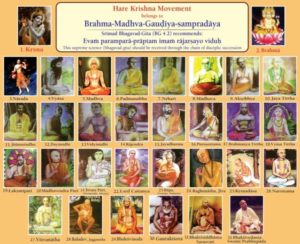Question
Maharaja dandavat all glories to Srila Prabhupada.
Can you recommend me some readings and verses about characteristics of a bonafide guru?
Here in Cancun there are so many cheaters and I would like to give a public class about it .. many people are looking for spirituality but fall with the wrong people and that is very sad.
YS Paramesvari dd
Answer
There surely are books on Guru Tattva but some of their siddhanta differ from Srila Prabhupada’s teachings and you, as an Iskcon preacher, may find yourself in an awkward position being questioned about them.
As far as the classic literature (Veda, Purana, Upanisad, etc.), as far as I know there are no books dedicated entirely and solely to the subject matter.
What is certain is that Srila Prabhupada speaks a lot on this topic, being Guru Tattva the most important.
I am collecting documents from many bonafide sources and as soon as possible I’ll publish a book.
As far as evident qualities of a spiritual master, there are many of them but three are the main ones.
First evidence:
1) He must be part of a legitimate sampradaya and parampara, and must be initiated by an authentic spiritual master (sad-guru).
There are four Sampradayas. Which are:
– Rudra Sampradaya
Suddha-dvaita-vada philosophy of pure non-dualism. Its founder was Visnusvami and renewed by Vallabhacharya (1481-1533).
– Sri Sampradaya
Visistadvaita-vada, unity philosophy in the organic whole founded by Ramanujacarya.
– Kumara Sampradaya
Philosophy Dvaitadvaita or Svabhavikha-bedhabheda founded by Nimbarka.
– Brahma Sampradaya
Philosophy Dvaita-Vedanta coming of Brahma and established by Madhvacharya.
One is considered part of a sampradaya not just on the basis of a formal initiation, but also on the condition that he follows and preaches its teachings. Otherwise his activities are considered apa-sampradaya, or deviant sampradaya and being part of it will give no spiritual benefit.
Bhagavad-gita 4.1 and 4.2 are evidences that this parampara system[1] is something created by Krishna Himself and therefore fundamental.
Second and third evidences are contained in a verse of the Mundaka Upanisad[2]:
tad vijnanartham sa gurum evabhigacchet
samit panih srotriyam brahma-nistham
We are now interested in the last two words: srotriyam and brahma-nistham
Second evidence:
Srotriyam is someone who has listened attentively to the teachings of Guru, Sastra and Sadhu, part of a Sampradaya, and can now instruct others in the same way. A srotriyam is a vastly learned person on philosophy, history and other Vedic sciences. He must be able to answer on the basis of authorities like the above mentioned Guru, Sastra and Sadhu.
Someone who doesn’t know the answers or can’t prove his statements with sastric evidences is a false srotriyam.
Third evidence:
Brahma-nistham means fixed in transcendental consciousness. He is not interested in anything material but his only interest in life is to practice and to teach Krishna Consciousness. He must live as a pure devotee of the Lord.
These qualities are very evident and easily observable.
However, as Srila Prabhupada said, this material world is divided in two groups: the cheaters and the cheated.
Those who want to be cheated will not care about the qualities of a true spiritual master. Actually they are not looking for a Sad-guru but for some cheater who will tell them what they like to hear.
[1] Knowledge is passed down from Guru to disciples.
[2] 1.2.12
This is a section of the book “Brilliant as the Sun”.
To buy the complete book, click above
Post view 435 times




Leave a Reply